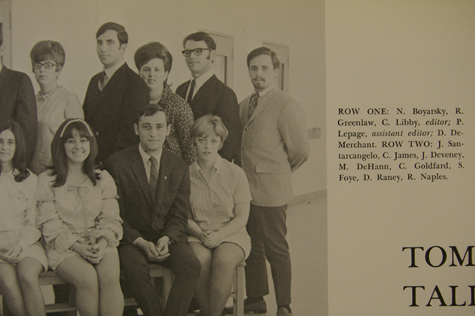There were a lot of takers. "It was right in the smack middle of the Vietnam era, and your student deferment would end if you stopped going to school," says Walter Sprague, who joined LePage's class from a three-year college in Boston sophomore year. "Many people wanted a four-year school." Husson, whose student body had previously been almost entirely from Maine, was suddenly split between natives and an odd assortment of students "from away." The out-of-staters were more likely to have taken onboard the fashions, haircuts, and ethos of the ongoing cultural revolution. "There was a lot of short hair, and those were usually Mainers coming out of small towns who would go back to them once they got a degree," says Sliter. "The college was very conservative — girls weren't allowed in the boys' dorm and vice versa — but they were all college kids, so they wanted to get laid and drink and have a good time. Fraternities and sororities were dying across the northeast at the time, but not at Husson." For male students, Tau Kappa Epsilon was dominated by out-of-staters; Kappa Delta Phi was a mixing ground for more privileged students; Mu Sigma Chi (or MEX) — which LePage joined — was dominated by Mainers, especially Franco-Americans. "For [white] out-of-staters, it would have been easier to get into the Black Panthers than to get into MEX," Sliter says.
Sprague was an exception to this rule, as he became friends with his dormitory roommate, the president of MEX. "The fraternity was very close, period," says Sprague, who also served with LePage on the school newspaper, in the Young Republicans club, and in the student senate. "We both had not political aspirations, but rather a bent toward some kind of leadership role. He was active in all the elements of the school's activities, political life, and student life. I'd characterize him as being fully engaged."
One of the biggest honors at Husson was to be elected "Chief for a Day," a sort-of homecoming king honor which theoretically allowed a student to act as the college's president for 24 hours. MEX nominated LePage and, by coincidence, a rival fraternity put his childhood classmate, Roland Moreau, up against him. "That year, for the first time, it was decided that staff and janitors could vote as well," Moreau recalls with a chuckle. "Paul won by two votes, and allegedly both were cast by janitors." Moreau was not aware that that electoral change had been engineered by LePage himself, a bit of rule bending that the governor remains proud of today. "He was in a larger, much more popular fraternity, and I was in a fraternity that was like Animal House," a grinning LePage told an audience at the Franco-American Center last year. "This is how I won . . . As president of the student senate, I convinced the student senate to allow everybody to vote! . . . And I never told Roland that. Strangely enough, he works for the state," the governor added, basking in his 40-year-old triumph, "for the revenue department."

WRAPPING UP AT HUSSON LePage in his senior portrait, and with people involved in campus politics, and on the newspaper staff.
|
As governor, LePage has regularly declared his contempt for the press. Ironically, at Husson LePage founded the school's first real newspaper on his own initiative and served as its first editor-in-chief. "The Tomahawk Tally has sometimes been mistaken for a newspaper, but it is not," LePage editorialized in the inaugural edition of the Spectator Weekly, which, he wrote, "will stamp out the communication gap [and] furnish a real newspaper to the students, faculty, and administrators at Husson College." Students and faculty were urged to "express their ideas and philosophies about society" in a mission to "conquer and destroy the apathy that surrounds us." Students responded, complaining about faculty hassling bearded, long-haired students and — especially — the obstacles administrators put in the path of drinking and getting laid.